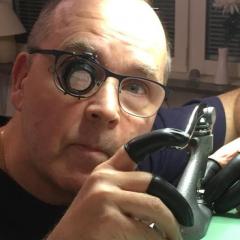-
Recently Browsing
- No registered users viewing this page.
-
Topics
-
Posts
-
Yes, Mine has a support for the blade that can be safely hit like this one https://www.amazon.co.uk/Rolson-62841-Tradesman-Knife/dp/B0044D9MC6/ref=sr_1_37?crid=3HWJF1HL4J8D7&dib=eyJ2IjoiMSJ9.X58oai8WcFho_-XqfR-lLQbU8lQKhf1vtFKAWbXR4EAhqVWR_eMy5h1DhaCULvkpA6XT0GaNFLHt_kJ0kPrhXFo0nYd8yJ4JgruoXDG9XjViAQOyAiBUkOhC9W9qQfGr0SMKpxIUrGOBkTjtTPTuM9IOTnb-dEAzbcZVvniVcEuMFGK9SITyDO6ryUU8ERkHt8f2Vy9Ks0QFO06KSJz65C2p7S3o2lOaUoO9kw61KyNtaaYYwdZzyuM2uRywODaigUn0u8RHMPR0dOa3WSrq8vE1iV5Et_561SFfvkhSGTQ.9QrdWVoCJpLVkrflNS1sxaY56ys4iiJspEFpUgLIRdg&dib_tag=se&keywords=stanley+knife&qid=1716289527&sprefix=stanley+knife%2Caps%2C77&sr=8-37 I use a brass hammer. You could use a very light pin hammer. A watchmaker's hammer would be a bit too light to use. I'm not sure of the weight, but looking at Cousins, it looks like a 60 or 84g brass hammer. I would go with the 84g one. A lot of the process is about feel, so you don't damage the case or bezel. Don't twist the tool! You may think it would make it easier and quicker, but that's when the damage starts to happen and be especially careful around the lugs. Once you have done a couple, you'll get a feel of it. Some bezels feel like they're not coming off and you start to doubt what you are doing. The trick is to be deliberate in your actions, rather than tentative. If you perform this task with the total belief that the bezel is coming off, that is exactly what will happen. First, be totally sure that the bezel comes off in the way you expect. Rub the blade against a piece of 400 grit wet and dry until blunt
-
By Neverenoughwatches · Posted
I do like the idea of clocks , you get so much more for your money than you do when buying a watch. -
No but I have taken it out of its case to make sure all is well.
-
By Neverenoughwatches · Posted
I read recently that there are almost 600 different patterns of overcoil.








Recommended Posts
Join the conversation
You can post now and register later. If you have an account, sign in now to post with your account.
Note: Your post will require moderator approval before it will be visible.